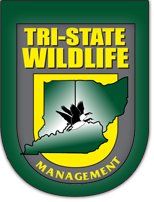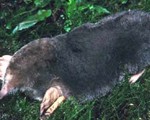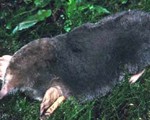Are moles ruining your yard? Call Tri-State Wildlife Management (TSWM) today to set up an inspection! (859) 635-0037.
Moles become quite a nuisance when they take up residence inyour yard. Although you will never see a mole since they live exclusively underground, they very literally leave paths of destruction as evidence of their presence. They can dig at a rate of 18 feet per hour, so it doesn’t take long for them to noticeably damage your lawn. Moles have runways and burrows deep beneath the surface of your lawn, but they also have surface tunnels, which are shallow, underground paths used for hunting worms, insects, and grubs. Moles create ridges in your yard when tunneling just below the surface. You may also spot mole mounds, which are accumulated dirt from tunneling. Moles do more damage than create unsightly ridges and mole mounds in your yard; they also kills grass and plants. When moles dig surface tunnels, it causes the roots to disengage from the surrounding soil. In the winter, the roots freeze from lack of insulation from the soil, killing the grass or plants. In the warmer months, the roots lose their access to the water from the soil. If not corrected, the the affected grass/plants die.
To take the guess work out of mole management, a trapping program should be implemented to ensure the violating mole can no longer be a nuisance. There are many home remedies that claim to rid your lawn or garden of moles, but there are no repellents or frightening devices that are proven effective (Internet Center for Wildlife Damage Management). If the mole isn’t removed, problems will continue to arise. Trapping is the most effective and safest method of mole control, therefore the method used by Tri-State Wildlife Management. TSWM is fully licensed and insured, and we stand behind all our work. Let us take care of your mole problem for you!
Tri-State Wildlife Management – Protecting You, Your Property, and Your Investment.











